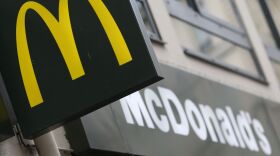
David Kestenbaum
David Kestenbaum is a correspondent for NPR, covering science, energy issues and, most recently, the global economy for NPR's multimedia project Planet Money. David has been a science correspondent for NPR since 1999. He came to journalism the usual way — by getting a Ph.D. in physics first.
In his years at NPR, David has covered science's discoveries and its darker side, including the Northeast blackout, the anthrax attacks and the collapse of the New Orleans levees. He has also reported on energy issues, particularly nuclear and climate change.
David has won awards from the American Association for the Advancement of Science, the American Physical Society and the Institute of Electrical and Electronics Engineers.
David worked briefly on the show This American Life, and set up a radio journalism program in Cambodia on a Fulbright fellowship. He also teaches a journalism class at Johns Hopkins University.
David holds a bachelor's of science degree in physics from Yale University and a doctorate in physics from Harvard University.
-
Decades back, former Federal Reserve Chairman Paul Volcker had a radical idea to fight against inflation.
-
A group of cancer doctors is trying to create a database on cancer drugs. It would give a score for each drug, reflecting how well the drug works. It would also list how much the drug costs.
-
Economics jokes can be hard enough to understand, let alone laugh at. NPR's Planet Money team recently tried some of its own jokes out on a live audience at a small comedy club in Brooklyn, N.Y.
-
David Kestenbaum of NPR's Planet Money tells the story of the first stock ever shorted. It's a tale of intrigue, lies, sabotage and a life of exile.
-
Two Planet Money listeners had an idea for how to make money off used textbooks. They gathered a year's worth of data to test their theory.
-
The signature is supposed to say, "This is me." But why do we still use it?
-
Ikea plans to raise its minimum hourly wage for retail workers to $10.76, and it's betting that the raise will pay for itself.
-
How much of what we think of as the beautiful sound of a Stradivarius is the instrument itself — and how much is the brand?
-
Greece's economy is expected to rebound this year. But for one couple living in Athens, things don't feel better.
-
Multiple economists have studied the fast-food industry to answer the question. They've found very different answers.





